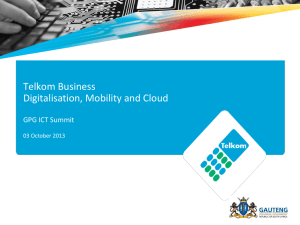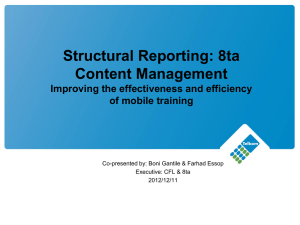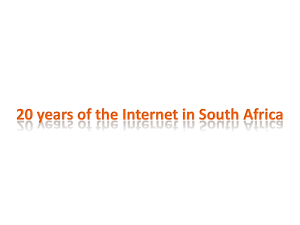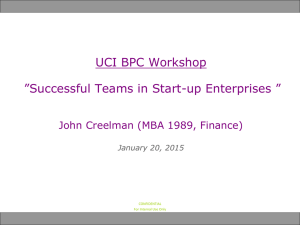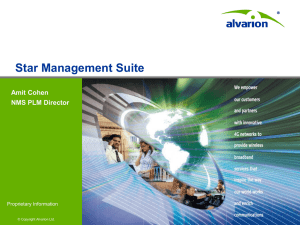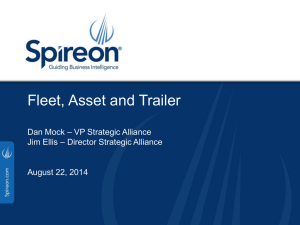Intervention - Solidariteit Telkom
advertisement
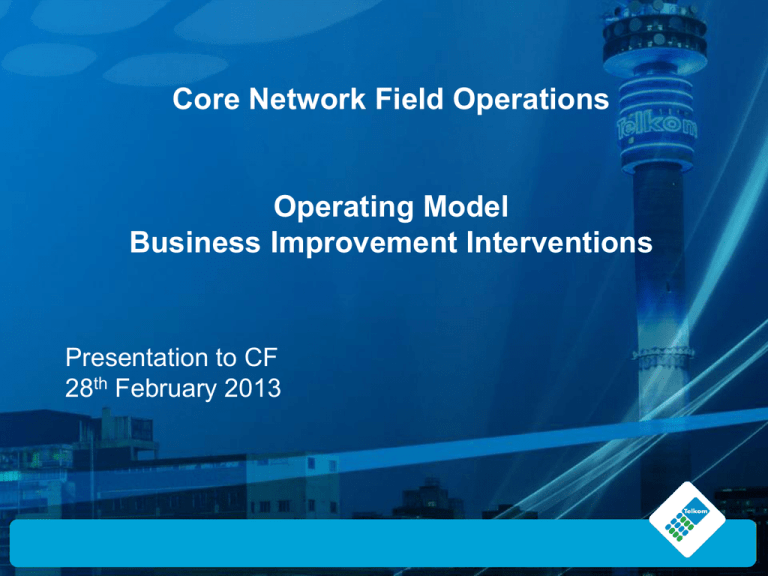
Core Network Field Operations Operating Model Business Improvement Interventions Presentation to CF 28th February 2013 Legal Notice This document, and the attachment/s thereto are intended strictly for the addressee(s), and should only be used for the purposes originally intended for. Any use of this document, or its attachments, by any one, and for any purpose other than for its original intent, is a violation of the confidentiality agreement stipulated by this statement. In such a case, Telkom reserves the right to claim direct, indirect, special or consequential damages, including, and without limitation, any loss of profits, loss of revenue, loss of income, business interruption, loss of programs or data to the value as determined by Telkom. Telkom shall also not be liable to any third party for damages of whatever nature suffered, as a result of the usage of this document for any purpose or reason other than that intended for Telkom Proprietary and Confidential information – Limited distribution under NDA only 2 CNFO OPERATING MODEL – Initiatives National Initiatives Regional Initiatives 1) Consolidate and Reorganise the Regional Administration and Support 4) Review and realignment of the Shift operations in line with changing business circumstances (NER / GCR) • • • • • Consolidate support functions within the regions CNFO to validate all the functions being performed and map it accordingly Support functions to be centralised per region / nationally Standardise dispatchable vs. non dispatchable functions 2) Mast and Tower • Address the issue of climbing to ensure long term sustainability of the operations • Review and / or re-align the shift in line with changes in technology and business Review the shifts at JDF and PPR and Satellite operations 5) Patch rebalancing in terms of workload / geographic / span of control (Western Region) • • • Rebalance workload Review the patches in terms of geographical area Improved Span of control and distribution of staff 3) Satellite Operations Review 6) Wall-to Wall Implementation (Southern Region (PE)) • • • • The Satellite environment is evolving from voice and data into a NGN IP solution with the new network equipment and therefore the need to review the current operations to understand and align the new functions with respect to Operating Model. Implementation of the wall to wall concept Implement training plan to support wall to wall concept Address current and future network changes that will impact on WFM dispatching 7) Workload / Patch rebalancing of workload (Eastern Region) • • • • Optimise patches due the reduction in ops managers Rebalance workload Review the patches in terms of geographical area Improved Span of control and distribution of staff Change Management Intervention 1 Intervention: Consolidation of Regional Administration and Support Region/s: National ( All CNFO Regions ) Area: All Regions Telkom Proprietary and Confidential information – Limited distribution under NDA only 4 Intervention 1 – Regional Admin & Support (RAS) Why the need for change Strategic Intent / Rationale ? • Non-standard regional support • Non-standard dispatch functionality • Inconsistent implementation of MLO • Critical functions not catered in regions • Functions performed not supported by appropriate JD (due to one size fits all) Who is Impacted by the Change ? • Current Maintenance Liaison Officers (MLO’s) • Business Support Administrator's (BSA’s) • Regional Spares Co-ordinator’s (RSA’s) • Regional Legacy Surveillance When is Change to be Implemented ? • Targeted implementation commencing 1st April 2013 What are details of FMO / Change ? • Re-focusing and consolidation of regional support • Mapping of staff to appropriate JD • Standardized dispatch methodology • Implement a standardized urban / rural enhanced MLO functionality • Re-focus legacy regional surveillance • Create focus on Service Delivery performance, improvement plans & KPI How is this going to be implemented ? • Mapping of staff to functional model • Define dispatchable vs non-dispatchable • Finalise functional list for RAS • Create and validate appropriate JD’s • Follow due process to moved identified staff to RAS Telkom Proprietary and Confidential information – Limited distribution under NDA only 5 Intervention 1 – Regional Admin & Support (RAS) Implementation Plan and Process Steps Action Step Who? When? 1. Communication with Organised labour regarding the Operating Model and CNFO initiatives Executive Senior Managers 06/02/2013 (Completed) 2. Clarification session - Follow-up session to further expand on the Operation Model and initiatives Executive Senior Managers 27/02 2012 3. Provide feedback to Company Forum regarding CNFO initiatives Executive 28/01/2013 4. Mapping staff based on current status in the regions Lucas van Aardt 01/03/2013 5.Consolidation of functions to align with Operating Model Senior managers 01/03/2013 6. Agreement and alignment of regional structure Executive Senior Managers 31/03/2013 7. Finalise JD and investigate additional JD’s based on the consolidated functions HR 31/03/2013 8. HR provide a process for staff linked to the RAS to be identified and then populate structures HR 31/03/2013 9. Draft a standard presentation to communicate to the regions Senior Managers 31/03/2013 10. Consult with staff regarding the RAS functions and obtain feedback Senior Managers 31/03/2013 11. Implement the RAS functions in accordance with the CNFO Operating Model Manager Q1 2013/14 Telkom Proprietary and Confidential information – Limited distribution under NDA only 6 Change Management Intervention 2 Intervention: Mast and Tower Climbing Region/s: National ( All CNFO Regions ) Area: All Regions Telkom Proprietary and Confidential information – Limited distribution under NDA only 7 Intervention 2: Mast & Towers Climbing Why the need for focusing on “ Mast & Towers Climbing “ Skills ? • Skill is essential for maintenance of the core network and servicing our customers. • Increasing relevance in mobile domain • History of wall-2-wall implementation – combined Transmission, Switching, Telematics and Microwave skills into one JD ( only microwave teams climbed ) • No differentiation on the wall-2-wall JD • Effective management and skills retention • Ageing workforce • Loss of staff to competitors What are the special skills of this job? • • • • • Climbing re-certification every three years Training provided by vendor cost of R1.2m Compulsory medical every year They have to keep trim and fit ! Technocrat and a value add of being a “bunging jumper” What are the Operational challenges? • Faults or maintenance on towers require double dispatch of 2 certified and competent climbers. • Legal requirement for Fall Arrest • Higher Volume of climbing in certain areas • High number of exits due to job offers by our competitors • Unable to climb due to ill-health • Climbers not motivated to climb due to lack of differentiation Who is Impacted by the Change ? • All Wall-2-Wall Field staff • All certified climbers Intervention 2: Mast & Towers Climbing What are the risk profile and hazards of this work environment ? Intervention 2: Mast & Towers Climbing What are the next steps and implementation plan ? Consultation and Approval Data Mining and Scenario Compilation Final Approval and Implementation • Consult with Line, Corporate HR & OL CF • Obtain approval from ME/MD, Group HR to continue with Investigation • Source Manual Data on Climbing • Build Scenarios Based on Sourced Information • Present Findings • Final Approval/ Way Forward • Target Date – 22 March 2013 • Target Date – June 2013 • Lucas van Aardt, Senior Management • Jay Naidoo, Lucas van Aardt • Target Date – by 31st March 2013 • Jay Naidoo Change Management Intervention 3 Intervention: Satellite Operations Review Region/s: NER Telkom Proprietary and Confidential information – Limited distribution under NDA only 11 Intervention 3 – Satellite Operations Review Why the need for change Strategic Intent / Rationale ? • The Satellite environment is evolving from voice and data into a NGN IP solution with the new network equipment(SSH Hub) • Investigate the current operations to understand and align the new functions with respect to the NCO Operating Model. Who is Impacted by the Change in CNFO? • Satellite Staff When is Change to be Implemented ? • Pending investigation in Q1 What are the next steps? • NCO Executives to align the Satellite assurance and fulfilment functions currently performed by Hartebeeshoek with the NCO Operational Model. • A Senior Management task team to investigate the impact to Satellite operations in the assurance and fulfilment value chain as per Executive decision taken. • Task team to present findings to NCO Executives. How is this going to be implemented ? • Consult with OL and present findings at CF on new operational model for Telkom SA Satellite. • Follow due HR processes if any staff will be impacted. Telkom Proprietary and Confidential information – Limited distribution under NDA only 12 Change Management Intervention 4 Intervention: Review and realignment of the Shift operations in line with changing business circumstances Region/s: NER / GCR Telkom Proprietary and Confidential information – Limited distribution under NDA only 13 Intervention 4 – Review and realignment of the PPR Transmission Shift operations in line with changing business circumstances Why the need for change Strategic Intent / Rationale ? • Maximizing operational efficiencies • Rebalancing of resources in Pretoria due to overload areas. • Transformation of Transmission Network to NGN resulted in less than 10% legacy equipment left in equipment rooms. • Less critical failures due to NGN equipment and customer redundancy configuration. Who is Impacted by the Change ? • 1 OPS Manager • 11 x OP1 staff – 3 staff working normal day and 8 staff working shift. When is Change to be Implemented ? • Management to set date after due consultation process What are details of FMO / Change ? • Investigation on financial and wellness impact on affected staff. • Investigation into workload and work management of shift environment. • Investigation into functions performed not dispatched via Advantex in shift environment. • Investigation on the impact for CNOM (NNOC) wrt service delivery on FCON failures. How is this going to be implemented ? • Design new resource model for PPR transmission patch based on workload during normal work hours. • Follow due HR process to moved staff as per options available for staff after agreement between all parties. Telkom Proprietary and Confidential information – Limited distribution under NDA only 14 Intervention 4 – PPR Transmission 24hr Shift Implementation Plan and Process Steps Action Step Who? When? 1. Communication with Organised labour regarding the Operating Model and CNFO initiatives Executive Senior Managers 06/02/2013 (Completed) 2. Clarification session - Follow-up session to further expand on the Operation Model and initiatives Executive Senior Managers 27/02 2012 3. Provide feedback to Company Forum regarding CNFO initiatives Executive 28/01/2013 4. Investigation Results, Shift Proposal, and Change management options meeting between Management, Organized Labour and Human Resources. Antoinette Stopford 14/03/2013 5. Brief all CNFO briefing on the Operating Model Antoinette Stopford 08/03/2013 6. Staff Briefing on the Shift investigation results and implementation process (as agreed HR/Unions/ER/Line Management) Antoinette Stopford 18/03/2013 7. HR to chair meeting to address Staff /Union concerns after Staff Briefing. Louis Fouche 25/03/2013 • 8. Management to set date after due consultation process Antoinette Stopford Q1 2013/14 Telkom Proprietary and Confidential information – Limited distribution under NDA only 15 Change Management Intervention 4 Intervention: Review of Shift and Re-alignment with changes in the technology and business Region: Gauteng Central Area: JDF Exchange Transmission Room 7th Floor and IMC Room 11th Floor Telkom Proprietary and Confidential information – Limited distribution under NDA only 16 •Intervention 4 – Review of Shift and Re-alignment Background on Shift The transmission shift environment in JDF was introduced approximately twenty years ago. There is transmission shift environment on the 7th Floor and the IMC (International Maintenance Centre) on the 11th floor Shift work was implemented mainly to deal with high priority faults in relation with the then risks associated catastrophic failures Shifts were required in the past as the legacy equipment was not managed from a central point and staff was needed on site to do surveillance and maintenance. All technologies except for the Transmission technology on the 7th floor and IMC on the 11th floor are manned during the normal week day and faults at night are attended to by a staff on standby All technologies except for the Transmission technology on the 7th floor and IMC on the 11th floor are manned during the normal week day and faults at night are attended to by a staff on standby JDF building houses Switching, Transmission, Non Voice, IP, Converged Network and Mobile equipment on the various floors. IMC was manned by RTS only and therefore do not provide support the OP1s Telkom Proprietary and Confidential information – Limited distribution under NDA only 17 Current Mode of Operation Current Mode of Operation 11th Floor : JDF IMC (International Maintenance Centre) presently has one OP1 technical officer and five S6 specialists performing a 24 x 7 shift. They are stationed on the 11th floor and from there are dispatched to 11th floor and JS in Hillbrow exchange. A six week shift cycle is in operation with one staff per shift. The shift consists of a day shift, afternoon shift, and night shift with rest days between shifts. Current Mode of Operation 7th Floor : JDF Transmission presently has seven OP1 technical officers performing a 24 x 7 shift. They are stationed on the 7th floor and from there are dispatched to 7th and 6th floor in JDF as well as MMJ, KSD & HRI being part of the section. A five week cycle shift is in operation with one or two staff working per shift on a rotation basis. The shift consists of a day shift, afternoon shift, and night shift with rest days between shifts. Telkom Proprietary and Confidential information – Limited distribution under NDA only 18 Why the need for change? Why the need for change Strategic Intent / Rationale ? •With the present NGN, the surveillance and restoration capabilities, configurations and patching of traffic can be done remotely by the NNOC via the management platforms. •. Following the recent resignations on JDF 7th Floor ( 2 and 1 demise) Shift – positions could not be motivated for back fill due to reduction of workload numbers. •Rebalancing of resources due to the reduction in work load as per Advantex data during office hours and after hours. •Staff experience is only limited to the transmission equipment more experience is needed on all the equipment in the NGN toolbox. •Staff working for long periods(years) shift and this is not conducive for our staff health •Align with the CNFO Operating model How is this going to be implemented ? • Design new resource model for JDF transmission/ IMC based on workload during normal work hours. • Follow due HR process to moved staff as per options available for staff after agreement between all parties. Telkom Proprietary and Confidential information – Limited distribution under NDA only 19 Intervention 4 – PPR Transmission 24hr Shift Implementation Plan and Process Steps Action Step Who? When? 1. Communication with Organised labour regarding the Operating Model and CNFO initiatives Executive Senior Managers 06/02/2013 (Completed) 2. Clarification session - Follow-up session to further expand on the Operation Model and initiatives Executive Senior Managers 27/02 2012 3. Provide feedback to Company Forum regarding CNFO initiatives Executive 28/01/2013 4. Investigation Results, Shift Proposal, and Change management options meeting between Management, Organized Labour and Human Resources. Gabriel Ramosolo 14/03/2013 5. Brief all CNFO staff on Operating Model Gabriel Ramosolo 08/03/2013 6. Staff Briefing on the Shift investigation results and implementation process (as agreed HR/Unions/ER/Line Management) Gabriel Ramosolo 18/03/2013 7. HR to chair meeting to address Staff /Union concerns after Staff Briefing. Louis Fouche 25/03/2013 8. Management to set date after due consultation process Gabriel Ramosolo Q1 2013/14 Telkom Proprietary and Confidential information – Limited distribution under NDA only 20 Change Management Intervention 5 • Intervention: Patch rebalancing in terms of workload / geographic / span of control • • Region/s: Western Region • Area: South Peninsula Intervention 5 – Workload / Patch rebalancing Why the need for change Strategic Intent / Rationale ? • Review the patches in terms of geographical area • Improved Span of control • Review distribution of staff between the current ops manager • Review workload What are details of FMO / Change ? • • • • • Relocation of staff Change in reporting lines i.e. reporting to different ops managers Continuous up-skilling of staff to meet the NG NEC changes to ensure that the staff remain relevant in the changing environment No change to JD MDF staff impacted by reporting lines How is this going to be implemented ? Who is Impacted by the Change ? • Technical Officer (OP1) • MDF staff (OP2) • Operations manager (M6) When is Change to be Implemented ? • Targeted implementation commencing 1st April 2013 • Review the proposed patches vs. WFM areas • Consult with Regional OL / operational staff and deal with queries • Facilitate the staff movement process • Redistribution of resources i.e. test equipment • Ensure and track the up-skilling of staff • Review to process quarterly Telkom Proprietary and Confidential information – Limited distribution under NDA only 22 CNFO WR South Peninsula – Current Structure Leeusig Patch 11 x Technical Officers Barrack Patch 12 x Technical Officers Mitchell’s Plain Patch 17 x Technical Officers Wynberg Patch 18 x Technical Officers CNFO WR South Peninsula – Proposed Structure Barrack Patch Rondebosch Patch 18 x Technical Officers 15 x Technical Officers Wynberg Patch 12 x Technical Officers Mitchell’s Plain Patch 12 x Technical Officers Intervention 5 – Workload / Patch rebalancing Implementation Plan and Process Steps Action Step Who? 1. Review the proposed patches vs. WFM areas RSA 28/02/2013 2. Validation of force to load per OVP Line Management 13/03/2013 3. Identify impact of staff changes Line Management 15/03/2013 4. Consult with Regional OL / operational staff John Thomas 19/03/2015 5. Consultation period for staff HR related queries Operational staff 22/03/2013 6. HR to facilitate to process with respect to staff movement between new patches HR 28/03/2013 7. Redistribution of resources i.e. test equipment Manager Ops Manager 29/03/2013 8. Implement training plan to ensure the skilling of staff for technology changes Manager / Ops Manager Ongoing 9. Implement changes – movement of staff into patch Line management 10. Review to process quarterly Manager Ops Manager Telkom Proprietary and Confidential information – Limited distribution under NDA only When? 01/04/2013 On-going 25 Change Management Intervention 6 • Intervention: Wall-to Wall Implementation • • Region/s: Southern Region • Area: Port Elizabeth Intervention 6– Wall-to Wall Implementation Why the need for change Strategic Intent / Rationale ? • Impact on WFM dispatching • Changes in the technology (NG NEC) • Up-skilling staff to ensure relevance during network transformation • Effective utilisation of current workforce • Alignment to CNFO Operating Model Who is Impacted by the Change ? • Technical Officer ( 41 x OP1’s ) • MDF staff ( 9 x OP2 ) • Operations manager ( 3 x M6 ) When is Change to be Implemented ? • Targeted implementation commencing 1st April 2013 with a phased approach taking into account upskilling What are details of FMO / Change ? • Relocation of staff • Change in reporting lines i.e. reporting to different ops managers • Continuous up-skilling of staff to meet the NG NEC changes to ensure that the staff remain relevant in the changing environment • No change to JD as all staff on current 220 JD • No re-location / job changes for MDF staff except for reporting lines changes How is this going to be implemented ? • • • • • • • Reviewing the proposed patches vs. WFM areas Consult with regional OL / operational staff and deal with queries Facilitate the staff movement process Redistribution of resources i.e. test equipment Ensure and tracking the up skilling of staff to meet wall-to-wall requirements Split the PE area into two patches Review to process quarterly Telkom Proprietary and Confidential information – Limited distribution under NDA only 27 Intervention 6– Wall-to Wall Implementation Implementation Plan and Process Steps Action Step Who? When? Review the proposed patches vs. WFM areas RSA / BOSA 28/02/2013 Validation of Force to load per OVP Line Management 13/03/2013 Consult with ops managers and operational staff regarding splitting of the PE urban area into patches with involvement of regional OL / HR John Thomas 19/03/2015 Consultation period for staff HR related queries Operational staff 22/03/2013 Finalise selection and staff movement process between ops managers HR 28/03/2103 Redistribution of resources i.e. test equipment etc Manager Ops Manager 29/03/2013 Draft to training plan for wall-to-wall and track progress monthly Manager Ops Manager On-going Implement staff changes into patch Line management 01/04/2013 Review to process monthly / quarterly Manager Ops Manager On-going Review the integration of microwave staff into the patches and review the ops manager requirements Managers 01/04/2014 Telkom Proprietary and Confidential information – Limited distribution under NDA only 28 Change Management Intervention 7 Intervention: Consolidation of Patches to cater for reduction of Ops Manager due to resignation Region: Eastern Region Area: Durban North, Phoenix, Mount Edgecombe, Tongaat, and Stanger DSSU areas Telkom Proprietary and Confidential information – Limited distribution under NDA only 29 Intervention 7 – DNN & PHX Restructuring Why the need for change Strategic Intent / Rationale ? • Reduction of Ops Manager due to resignation • Business decision not to backfill • Patch consolidation and reduction by one • Alignment to span of control • Force to workload balancing Who is Impacted by the Change ? • 2 x Ops Managers in respective patches • MEC/PHX ( 10 x OP1’s & 1 x OP2 ) • Patch rebalancing of 4 x OP1’s • TO & SNG ( 11 x OP1’s ) • DNN ( 8 x OP1’s & 2 x OP2 ) When is Change to be Implemented ? • Targeted implementation commencing 1st April 2013 What are details of FMO / Change ? • Investigate current patch workloads • Consolidation and create 3 patches • Change in reporting lines of Operational staff with some rebalancing and office relocation • No change in JD • KWM & DC Power ( 15 x OP1’s & 1 x OP2 ) not impacted How is this going to be implemented ? • Mapping of operational staff • Consult and present proposals with OM & Operational Staff with involvement of Regional OL & HR • Brief all impacted staff • Facilitate staff movement with HR • Review impact of change Telkom Proprietary and Confidential information – Limited distribution under NDA only 30 Intervention 6– Wall-to Wall Implementation Implementation Plan and Process Steps Action Step Who? When? Review the proposed patches vs. WFM areas RSA / BOSA 28/02/2013 Validation of Force to load per OVP Line Management 13/03/2013 Consult with ops managers and operational staff regarding the patch consolidation and resource plan with involvement of regional OL / HR Jay Ramlal 19/03/2015 Consultation period for staff HR related queries Operational staff 22/03/2013 Finalise selection and staff movement process between ops managers HR 28/03/2103 Implement staff changes into patch Line management 01/04/2013 Telkom Proprietary and Confidential information – Limited distribution under NDA only 31 Q&A End



